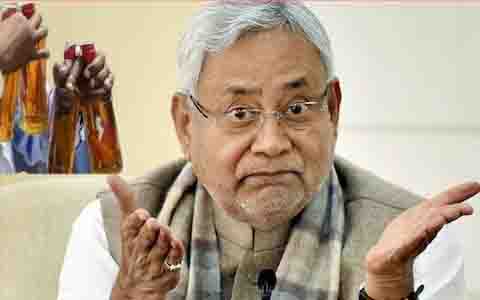
In Bihar, where liquor is prohibited, the people involved in the illegal liquor business have once again slapped the government hard. They openly sold poisonous liquor at the fair and more than two and a half dozen people died after drinking it. Many people lost their eyesight. This incident that happened in Siwan and Saran districts has once again exposed the Nitish government.
This incident proves that the Nitish government is completely failing to implement the liquor ban and is not even learning from the past incidents. There have been many incidents of people dying due to drinking poisonous liquor during the liquor ban. The biggest incident took place in Chhapra (Saran) in December 2022. Then 71 people died due to drinking poisonous liquor. 44 people were killed in Mashrak alone. Still, the connection of the latest poisonous liquor scandal has also been found with Mashrak. Some of the traders of Mashrak are also among the people arrested after the incident.
It is clear that even after such a big incident, Bihar police failed to stop the business of poisonous liquor. It failed even at that place where about four dozen people had lost their lives after consuming poisonous liquor.
While the business of poisonous liquor is not stopping in the state, the smuggling of liquor is also continuing. On 15 October, liquor worth about one crore rupees was seized from a single vehicle in Banka. In such a situation, the question arises whether the Nitish government needs to reconsider the decision of prohibition. Will he take a U-turn on this issue before the elections or will he be ready to face the opposite bet?
The Nitish government implemented a liquor ban in April 2016. Then women's groups across the state had launched a campaign against liquor because it was considered to be the cause of domestic violence and financial crisis. The government claimed that the liquor ban would bring happiness and prosperity to families and that cases of domestic violence would decrease.
Nitish Kumar also hoped that his move would give him electoral benefits. In particular, he hoped that the support of women and marginalized sections would increase.
It is said that Nitish Kumar also got the benefit of this in the first assembly elections held after the liquor ban. Especially women voters supported him for this.
Cases of domestic violence also reduced, according to the health journal 'Lancet', due to prohibition, 21 lakh cases of domestic violence were reduced and 18 lakh Bihar residents could avoid obesity.
There is no doubt that alcohol consumption was a big problem in Bihar. According to the 2011-12 data of the National Sample Survey Office (NSSO), the average annual consumption of alcohol per person in Bihar was 14.7 liters. There were only five states in the country where this figure was higher than this. According to the 2015-16 National Family Health Survey (NFHS) survey, about one-third (29 percent) of men and one percent of women above 15 years of age consumed alcohol. There were reports of a significant improvement in the condition of women due to prohibition. Both economically and socially.
But, the Nitish government was weak in implementing the liquor ban from the beginning. Due to this, the atmosphere created in his favor due to the liquor ban gradually started weakening.
Statistics also tell the story of the Nitish government's failure to implement a liquor ban. Even after nearly three years of prohibition, a large number of people continued to consume liquor. However, in these three years, the number of men consuming liquor decreased by only 41.78 percent. The number of people drinking liquor 'almost every day' decreased to 29.72 percent and the number of women drinking liquor decreased by nearly 70 percent.
The failure to implement prohibition exposed many flaws in Bihar's administrative system. After prohibition, the business of illegal liquor grew rapidly. There has been an increase in the smuggling of liquor from the neighboring states of Uttar Pradesh, Jharkhand,, and Nepal. After prohibition, the government could not hit the empire of illegal traders and smugglers. People started saying that liquor became more easily available after prohibition, the difference was that more money had to be spent. Allegations were made that prohibition gave birth to a parallel economy of black money, and a large number of youth got involved in the illegal business of supplying liquor. Even smugglers made women their 'career'.
The repeated incidents of people dying after consuming spurious and poisonous liquor show the failure of the administration. The cases of liquor ban violations have increased so rapidly that the courts and prisons are overburdened. Thousands of cases are pending, making it difficult to pay attention to other important matters.
The police had unlimited powers to enforce prohibition, which increased corruption and harassment of the common people. There are also allegations of implicating people from poor and deprived sections in false cases on the one hand, the government talked about empowering families through prohibition, on the other hand, men in many families started consuming drugs instead of alcohol, which is creating new problems.
The state government suffered huge financial losses due to the liquor ban. Excise duty from liquor sales was earlier an important part of the state's revenue. This loss has also affected welfare schemes and development work. The government could not prepare any alternative to compensate for this loss.
Meanwhile, the Nitish government had to take a U-turn. While relief announcements had to be made at the legal level, it also had to soften its stance on the issue of compensation for death due to consumption of poisonous liquor.
Now once again, prohibition is sure to become an issue in the 2025 assembly elections, because Prashant Kishore, who is going to contest the state elections for the first time after forming a party, has said that if his Jan Suraj Party comes to power, the first decision it will take is to remove the liquor ban. Due to the problems arising from the failure of the Nitish government to implement the liquor ban, he is no longer getting the same public support on this issue as before. The opposition is also putting pressure on him by saying that Nitish implemented the liquor ban without full preparation and due to this created many new problems. In this way, Nitish's bet on a liquor ban in this election may backfire. Or, he may have to change his stance before the elections.

 Desk
Desk Share
Share
_939839210.jpg)





